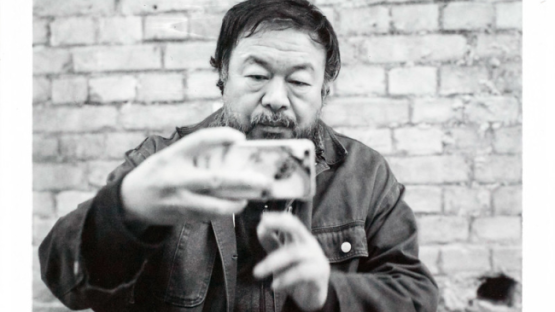
Photo of Ai Weiwei by Alfred Weidinger available on flickr
You have the right to share the benefits of your community’s culture, arts and sciences.

Photo of Ai Weiwei by Alfred Weidinger available on flickr
Chinese artist Ai Weiwei creates art that highlights the harmful effects of surveillance on society — and is himself a target of persistent surveillance by the Chinese government. In an article for Agence France-Presse, he said, "In my life, there is so much surveillance and monitoring -- my phone, my computer ... Our office has been searched, I have been searched, every day I am being followed, there are surveillance cameras in front of my house.”
Weiwei is an artist, blogger, documentary filmmaker, and architect whose projects often center on surveillance, the police state, and Chinese socio-political issues, particularly China’s stance on human rights. In 2011, Weiwei was arrested at an airport in Beijing and detained for 81 days without being charged or convicted for any offense. His passport was confiscated by Chinese authorities and withheld for four years, and after his first trip outside of the country in 2015, he returned to discover surveillance equipment installed in his home by the Chinese government.
To satirize his life under perennial government surveillance, in 2012, Weiwei installed four surveillance cameras within his own home and broadcast the feeds live to weiweicam.com, until it was quickly shut down by Chinese authorities. He also co-created a massive interactive public art installation in New York City on modern corporate surveillance, critiquing how, “we trade our privacy for fun,” and are, “creating our own surveillance.”
Weiwei is not the only dissident to use art as a form of protest against the Chinese government. Activists in Hong Kong have also turned to sharing protest art anonymously online as a way of circumventing censorship and repression. According to one Hong Kong digital dissident artist, “Most members of the protest creative community are known to each other only by their online identities.”
Dissident artists, scientists, and other cultural creators around the world rely on privacy to protect their material and moral interests in their creations and to make their voices heard without fear of persecution. The right to be free from arbitrary interference with our privacy creates the space in which the arts, the cultural life of the community, and scientific advancement can flourish free from external burdens of surveillance.
Our right to participate in community life, enjoy the arts, and share in scientific advancement should not be subject to unlawful government interference. Privacy is essential to protecting our right to freely participate in the cultural life of our communities.
1. Everyone has the right to freely to participate in the cultural life of the community, to enjoy the arts and to share in scientific advancement and its benefits. 2. Everyone has the right to the protection of the moral and material interests resulting from any scientific, literary or artistic production of which he is the author. Article 27, Right to take part in cultural, artistic and scientific life